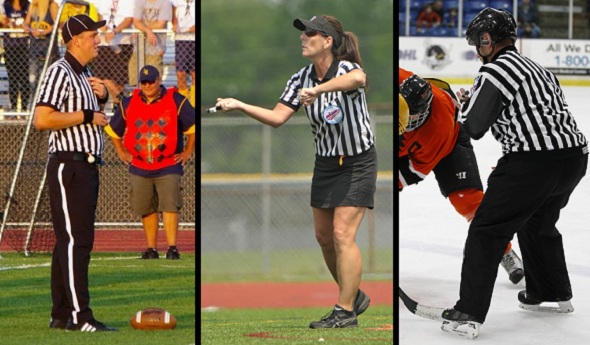
Making - and Answering - the Call
September 28, 2012
By Rob Kaminski
benchmarks editor
“Life is a game with many rules but no referee. Small wonder, then, that so many play dirty, that so few win, that so many lose.” – Joseph Brodsky, Russian Poet and Essayist
To varying degrees, the world of athletics mirrors society. There are winners and losers. There are participants who look for ways to skirt the rules. However, in considering Mr. Brodsky's quotation above, there is one glaring difference between sports and life. Our games do have referees. Because of that, dirty play is less rampant and our games have more winners than losers, for the scoreboards only tell part of the story. There are lessons in winning and losing within the framework of enforced rules, lessons which equip young people with the tools to make society a little better in the future.
In life, the deck is stacked in favor of the players. According to one 2010 census, there were 1.8 police officers per 1,000 citizens in Michigan, a ratio which ranked 40th in the United States.
In contrast, during the 2011-12 school year, there were 37.2 registered MHSAA officials per 1,000 high school participants. Maybe, just maybe, that’s why school sports are at odds with Brodsky’s depiction of society; there are simply more cops on the beat.
At the very least, officials play a vital role in the existence of school sports. The games can’t go on without these men and women, and the MHSAA annually seeks improved recruitment and retention methods to promote growth of this group so integral to the health of its product.
They answer the call
So who are these people whose best work goes unnoticed; of whom perfection is the expectation; and who automatically alienate 50 percent of interested parties each time they make a decision? Who applies for this job? Why are some suited for the task, and others not? Asking why people leave the officiating life can often reveal just as many clues as talking to those who stay.
 In 2004, the MHSAA conducted a survey targeting former officials to reveal their reasons for leaving the avocation and ask what might be done to bring them back.
In 2004, the MHSAA conducted a survey targeting former officials to reveal their reasons for leaving the avocation and ask what might be done to bring them back.
The top three reasons people hung up their whistles or other tools of the trade were as follows: 1) career change/job demands; 2) poor sportsmanship by coaches and fans; 3) local association politics. Time spent away from family was also cited as a prime reason for leaving the games.
Eight years later, in a survey this August, the MHSAA again called upon former officials to generate data which can be helpful in recruiting new officials or luring back “retired” veterans.
Of more than 600 respondents at press time, the consensus of comments indicate a shift in culture. Career and personal demands no longer top the chart as reasons for leaving. Today’s barometer indicates that local association politics (the ability to receive games and advance through the ranks) and a lack of adequate training for new, younger, officials rank as the prime reasons for people exiting the game relatively early in their quest.
Sportsmanship concerns for the behavior of coaches, parents and participants still rates as the second-greatest deterrent.
“It is imperative to survey our constituents on a frequent basis so we can react to the various factors which prompt trends in the industry,” said Mark Uyl, MHSAA assistant director who oversees the state’s 12,000 registered officials. “I think we’ve successfully addressed some issues based on the findings from the 2004 survey, and we expect to analyze this year’s questionnaire at length to address the most pressing issues accordingly.”
The majority of the slips filling the suggestion box from the August survey: 1) provide increased training opportunities for new officials; 2) work with local associations to create more opportunities for new people to receive a greater number of games; 3) allow officials to rate schools and coaches, and develop programs for peer evaluation, rather than receiving ratings from coaches only.
The MHSAA has made strides in tackling each issue, and this year’s data will further focus its efforts to improve the officiating environment.
In recent years, the MHSAA has conducted officials camps in basketball and football (see stories on pages 14 and 33) and created an officials video training page on MHSAA.com.
While the officials ratings still come from the schools, local approved officials associations now submit candidates for MHSAA tournament assignments, and the nominations hold more weight with the MHSAA than ever before. As a result, local associations are better evaluating their members.
Additionally, officials can now access and submit a school sportsmanship feedback form to rate school facilities and coach, player and spectator behavior. Findings from this year’s survey indicate that officials would like a more detailed system, and a greater emphasis on sportsmanship education for coaches. To that end, the MHSAA offers one of the most comprehensive coaches education programs in the nation through its Coaches Advancement Program, and offers incentives to those who register for classes, many of which tout sportsmanship.
“We also encourage local associations to communicate with leagues and conferences outside the playing boundaries,” Uyl said. “Several associations invite coaches to a meeting or two each year for honest, face-to-face discussion. We’ve also been told of schools which invite a veteran official to parents meetings or team meetings prior to the season to help explain rules and their role in the games. Conversation in these settings serve our members well and assist in breaking down barriers.”
Key to growth and improvement of MHSAA sports officials are the efforts of local approved associations.
“There is no question that any successes we enjoy as a state association are directly related to the leadership of our local associations,” Uyl said. “Through programs like our train-the-trainers sessions each summer we can put the wheels in motion, but the real grass-roots education of our men and women happens in communities throughout the state. And, the people in place to carry out our officials education are second to none.”
Recruitment starts with family
If there’s anything you’ll take from this issue of benchmarks, it’s that there are no better recruiters, – no more qualified individuals to blare the trumpets – than officiating’s own family members. It’s a recurring theme repeated by numerous individuals.
Carl Van Heck, assigner for the West Michigan Umpires Association, said his association attempts to identify MHSAA-registered umpires in the area not currently members of the WMUA and invite them to join. His association also attracts a few individuals per year through an ad in the Grand Rapids Press. The real recruitment and retention begins once the rookies are in the association.
 “Our executive board recently voted to install a mentoring program which will pair a veteran official to work a number of games with a new official to get him or her started on the right foot,” said Van Heck. “This is on a voluntary basis for both the veteran and the newcomer, and they are assigned these games in addition to their regular schedule.
“Our executive board recently voted to install a mentoring program which will pair a veteran official to work a number of games with a new official to get him or her started on the right foot,” said Van Heck. “This is on a voluntary basis for both the veteran and the newcomer, and they are assigned these games in addition to their regular schedule.
“We also conduct an annual clinic on a Saturday at Grand Valley State University that is free to all of our members. We want the best-trained umpires both new and old to put on the field for the schools we work for.”
That’s the hook; making new officials feel comfortable while increasing their skill level and affording them ample opportunities to work.
While much of this responsibility falls to the local level, much is also expected of the MHSAA to assist in this process.
“The biggest obstacles young referees face in officiating high school soccer matches are legalistic rule changes, lack of expert feedback and lack of opportunity,” said Alex Smith, president of the Greater Lansing Area Soccer Referees Association. Smith opines that onfield issues in soccer are often met with the addition of a new rule, and in many instances there aren’t enough knowledgeable leaders to assist the younger soccer officials.
“For excited young or new referees looking to improve, there are few, if any, options for unbiased or expert feedback for them to consult,” Smith said, while adding that continued efforts between GLASRA and the MHSAA could soothe development issues.
“Certainly, in recent years GLASRA and others have given MHSAA credit for beginning to address these weaknesses. It's our hope that MHSAA continues to refine, streamline and improve its development and retention of new officials,” Smith said.
Uyl agrees, and welcomes input from all entities around the state.
“Some of the areas identified from GLASRA and other associations in other sports continue to be on the radar for improvement and change,” Uyl said. “Frank, honest and professional feedback is the only way we can keep moving forward in the right direction together with all of our officials.”
Onward and upward
At times, it seems, the biggest roadblock to officials advancement is officials themselves, resulting from a collision of two eras.
When it comes to younger officials proclaiming a lack of training opportunity and game assignments, how much of it is a reflection of societal change? Newer officials are raised in a world of instant gratification; from fast food, to satellite TV, to smart phones and the Internet, they are of the culture that gets anything it wants, when it wants.
Older officials, who tend to be the assigners, have an understanding of what it takes to work the highest levels of a sport. They know what they’ve been through to move up the ranks, and they know who they’ve moved up with. It becomes a matter of trusting the known, and being suspicious of the unknown. Yes, at times, the industry can be a “good ol’ boy network.”
The challenge is to make sure the new kids are aware of existing training opportunities and the investment necessary for advancement, while opening the veterans’ eyes to a pool of new talent and identifying those best suited to lead the neophytes.
“Again, I think this is an area that’s improving as we try to encourage our leaders around the state to take ownership in the development of our young officials,” Uyl said. “We constantly encourage our associations to nominate ‘new blood’ for our tournaments, and I think associations can take pride in turning out young people who are knowledgeable, physically fit and passionate about this business we’re in. It’s a people business, first and foremost, so it’s paramount that our own kind work together.”
As mentioned, the MHSAA began seeking greater input from approved associations for its tournament selection a few years back. While the coaches rating system still serves as one of the gauges, the ratings are not the be-all, end-all when it comes to assignments. Local associations need to take that lead.
“We promote our officials from the subvarsity level to the varsity level based on ratings, and there is a lack of ratings from our local schools for officials working on the subvarsity level,” Van Heck said. “We tend to lose officials who after the third year are not advancing due to lack of ratings.”
The WMUA’s new mentor program can serve to change the culture there. As more feedback is gathered from veteran officials working with the newcomers, less weight can be attached to coaches ratings which seldom arrive.
In any line of work, people want to be rewarded for their efforts, or, at the very least, appreciated by their peers. If it’s motivation, education and affirmation that young officials are seeking, there will be no better place to look than Grand Rapids next July. A day-long event tailored to high school officiating in Michigan takes place Saturday, July 27, preceding the 2013 National Sports Officials Association Summit. All registered MHSAA officials are encouraged to attend. Registration information will be posted to MHSAA.com later this fall.
Last call
Survey examines reasons for calling it quits
Following is a sampling of responses from former officials offering reasons for leaving the playing fields and arenas, along with suggestions for retention. Complete survey results can be found on the Officials page of MHSAA.com.
- “Maybe some further education for the coaches, who in turn can educate their parents, might help the process. We, as officials, don't question the play calls of the head coach publicly. Why should it be fair for the coach to question the calls of the official publicly?”
- “Find a way to schedule officials who want to work games. People want to work, but no one wants to schedule them. I often hear it is a lack of experience, but you can't get experience unless you work games.”
- “When a new member comes on board, have an experienced official contact him or her immediately about assignments. This will make his or her first game more comfortable. Officials are team players just like those who they will officiate.”
- “The time away from family, the cost and effort to stay certified, and the commitment to staying conditioned and prepared for the level of play unfortunately does not surpass the "lack of fun" that refereeing soccer has become. A solution seems unrealistic because of the scope of the problem – but it needs to start somewhere. Great idea to send this survey and begin the process of improvement.”
- “I was woefully unprepared and lacked the knowledge necessary to be an effective official. If it weren't for an optional clinic I took part in, I would have been a disaster. A lot of that is on me, but I can't believe I was let on the field by the MHSAA considering how little training and information I was provided. Rookie officials need more shadowing and more observation before being put into a game.”
- “I just wanted to officiate middle school sports and was very comfortable with this level. I quickly learned being part of a local association of officials and going through that hoopla was more of a pain. I got a couple games because I knew the middle school administration, but that was too short-lived.”
- “Legislate how much the assigners can charge young official to attend camps. I found that the amount of instruction was not commensurate with the charge. I don't have a major problem with assigners being compensated for their organizing and other things they might being doing. However, officials should not have to break even or operate at a loss when the assigners are padding their pockets.”
- “Improve education on how to prepare for unreasonable fans, coaches and parents. Also improve on the efforts of team’s comprehension of rules. Coach and fan behavior: I’ve officiated 25-30 minor league baseball games. We take more abuse at the high school level. It just got old.”
- “I believe coaches and athletic directors should introduce graduating seniors to local associations. This would get younger people involved.”
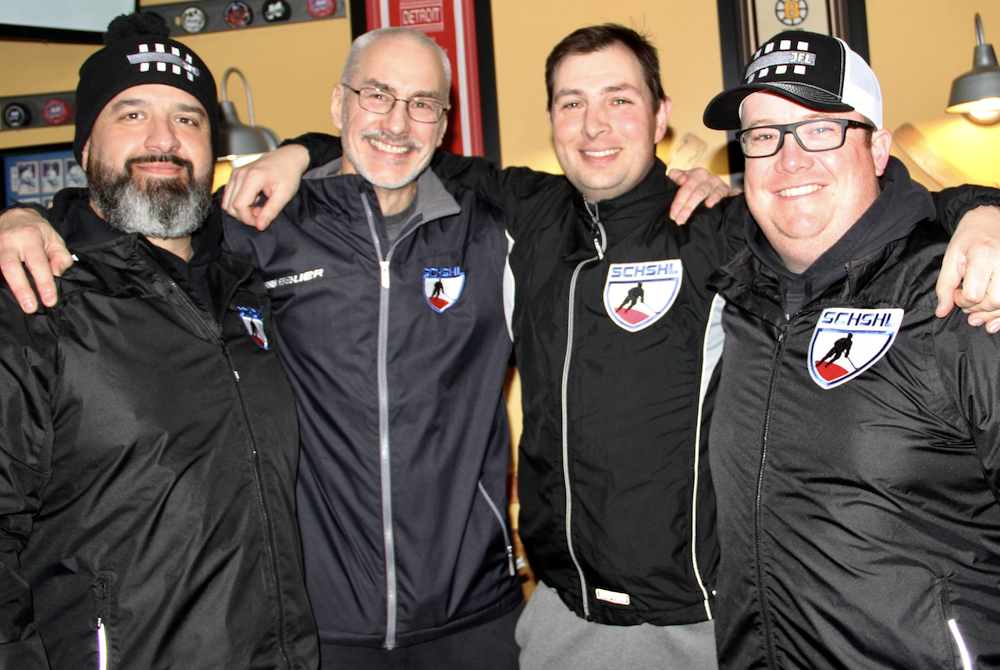
Referee Camaraderie: Bloopers, 'Nerding' Out, Lots of Laughs Create Powerful Bond
By
Pam Shebest
Special for MHSAA.com
February 13, 2024
KALAMAZOO — When it comes to blooper highlights, four MHSAA hockey officials don’t hesitate to share their miscues.
 One of them, Bob Corak, even has his pratfalls set to music on an internet site called Zebras with Pucks.
One of them, Bob Corak, even has his pratfalls set to music on an internet site called Zebras with Pucks.
Laughter is the sound of the day when the four gather every Tuesday after their yoga class at Nisker’s Char-Grill & Slap Shot Hockey Bar in Kalamazoo.
The camaraderie between Corak, Corey Butts, Nick Schrippa and Nat Swanson is evident, but the tone gets more serious once the talk turns to officiating.
“We’ve all played, we’ve all coached to some extent, but officiating is just what speaks to us,” Schrippa said. “That’s our niche.
“Every player on the ice has a fan in the stands. Every player on the ice has support on the bench. We’re the only support we have in the arena. We’re the only ones we can lean on. We’re kind of on an island.”
Most times the friends are part of different four-man crews made up of two referees and two linesmen for South Central High School Hockey League games. But that just gives them more to talk about when they get together on Tuesdays.
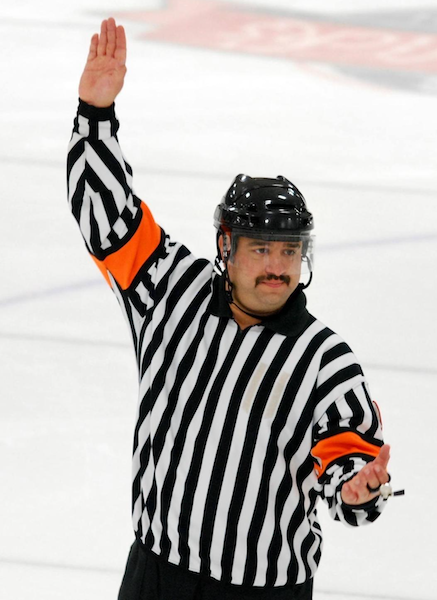 “We spend an hour every Tuesday with Bob’s wife (Susan) just kicking the crap out of us and then come to (Nisker’s) to debrief,” Schrippa said. Susan Corak runs Be Well Yoga and Fitness in Kalamazoo.
“We spend an hour every Tuesday with Bob’s wife (Susan) just kicking the crap out of us and then come to (Nisker’s) to debrief,” Schrippa said. Susan Corak runs Be Well Yoga and Fitness in Kalamazoo.
"We never talk about the workout. Somebody will bust out a phone and we’ll go over a video and we’ll talk about a situation, talk about rule differences,” he continued. “We are nerds to the nth degree, and that’s just how we’re wired.”
Yoga is a good way to keep in shape, the four friends agree.
“I’m a little older than most of the referees I meet,” said Corak, who retired after 35 years with Pfizer in information technology. "It keeps me limber, keeps me in shape to an extent, not a lot of cardio but the strength is there that we get from yoga, especially the core, plus injury prevention.
“If I’m not skating, I’m officiating or I’m working the books for the association (Kalamazoo Ice Hockey Officials Association).”
Corak assists in the scheduling, billing, etc., leading Schrippa to quip: “Remember when Bob said he did information technology? We take full advantage of that. He is, in fact, the glue that holds a lot of our shenanigans together. He really is.”
Referees vs. Linesmen
Butts and Corak prefer wearing the referees’ armbands, while Schrippa and Swanson like working the lines.
“’I’m a smaller guy,” said Butts, who has been officiating for 14 years. “Linesmen typically tend to be 6-foot-5. When you’re smaller than most of the players, it doesn’t work out well.
“I like the freedom to be able to get out of the way. It’s a high traffic area as a linesman.”
When not spending evenings officiating, Butts is the penalty box timekeeper for the ECHL Kalamazoo Wings home games. His day job as a third-party examiner for the state of Michigan means he gives driving tests, and that leads to some interesting conversations.
“I’ve given most of (the players) their driver’s licenses,” he said. “I’ve had a group of players in the middle of a high school hockey game, getting ready to drop the puck at the start of the third period, and they’re trying to schedule a driver’s test for the next day. I’m like, ‘Guys, not now. Talk to me after work.’”
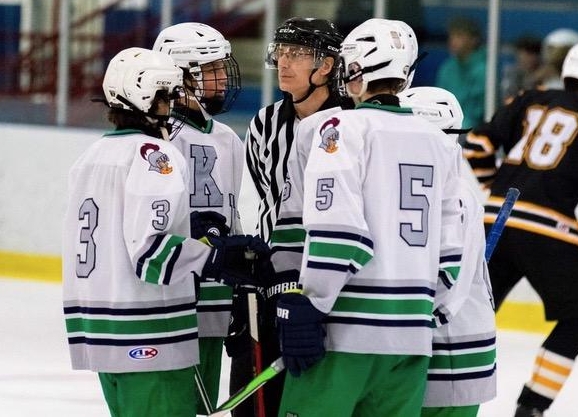 Swanson is the newest of the quartet, moving to the area three years ago from Syracuse, N.Y., where he started officiating at age 11.
Swanson is the newest of the quartet, moving to the area three years ago from Syracuse, N.Y., where he started officiating at age 11.
He is a pilot in the U.S. Air Force International Guard in Battle Creek flying MQ-9 Reaper Drones.
“I like refereeing better (than being a linesman) because I like managing the game and look at the big picture,” Swanson said. “Sometimes it’s great to be a linesman because they get to communicate with the players, crack jokes and sometimes throw the referee under the bus, ‘Yeah, I agree that was a terrible call. But you’ve got to move on.’”
All four also officiate college and youth hockey, which can lead to a dilemma.
“Those are all different rule books, so we don’t have to know just one set of rules,” Schrippa said. “None of them are what you see on TV.
“While we have a couple hundred people in the building who are yelling at us that we got it wrong because that’s what they saw on ESPN, that’s not how it works. So not only do we have to know the rules, we have to know the differences in the rules.”
With mentorship programs available, some current prep players are also officials for younger leagues.
“They’re learning, we’re teaching them,” Corak said. “We have games with them as officials, then we’ll officiate their games when they play for their schools.”
Swanson added: “I think that makes them better players because they understand the rules, where they can bend rules and where they can’t.”
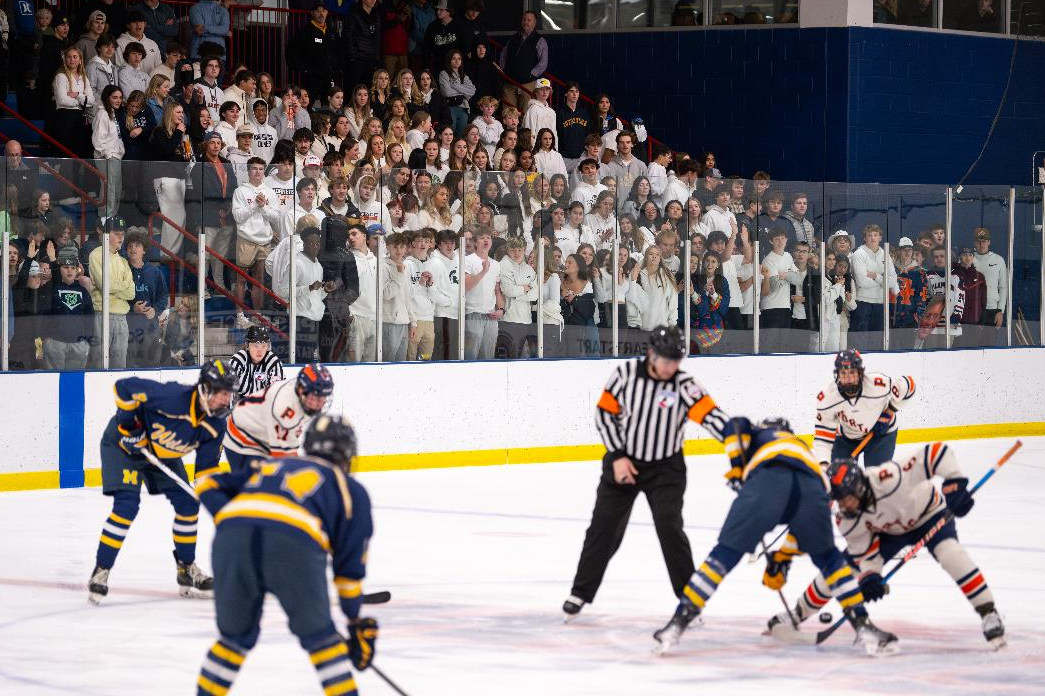 That is what led Schrippa to officiating.
That is what led Schrippa to officiating.
“(Late referee) Mike Martin was officiating a game and pulled me aside,” he said. “I was 22 years old and he asked if I wanted to become a ref.
“‘(Heck) you’ve broken all the rules,’ he told me. ‘You probably know most of them already. He wasn’t wrong. I talked to a couple friends who had done it, and they talked me into doing it 29 seasons ago. I fell in love with it.”
Fun with bloopers
All four laugh as they regale each other with their funniest and most embarrassing moments.
For Schrippa, it was the college game where he made his refereeing debut.
“I was given the rookie lap,” he said. “I was jazzed. I came out of the gate, turned left, went around the back of the net, got to the blue line, caught a toe pick and Supermanned, slid from the blue line to the top of the next faceoff circle and was soaked because the ice hadn’t set yet.
“I got a standing ovation from the few hundred fans that were in the rink. Both my linesmen were doubled over laughing. It was a very cold first period.”
Something similar happened to Swanson.
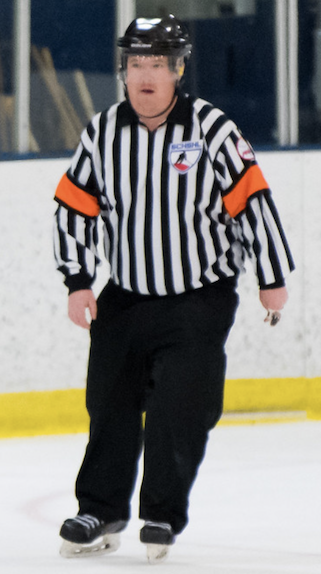 “I was taking a hot lap, not seeing they’ve got a carpet out for somebody, hitting the carpet and Supermanning,” he recalled. “Then having a linesman watch you do it as there’s a few hundred people in the stands and give a big washout sign.”
“I was taking a hot lap, not seeing they’ve got a carpet out for somebody, hitting the carpet and Supermanning,” he recalled. “Then having a linesman watch you do it as there’s a few hundred people in the stands and give a big washout sign.”
Butts and Swanson had moments that actually delayed the start of a game.
For Butts, “I forgot my pants because I washed them separate and my wife had to bring them to me, and we could not start the game until my pants arrived,” he said, while the others laughed and nodded in agreement.
Swanson actually found himself at the wrong rink one time.
“I’m like, ‘Where is everybody?’” he said. “My phone starts ringing. ‘Hey dude, game starts in 15 minutes. You going to be here? Uh, yes, in 20.’’’
The four agree most officials go through highs and lows, funny times and embarrassing times, and that’s one thing that brings them all together.
“What’s unique about what we do is I could meet another official from Sweden tomorrow who I’ve never met before, and within minutes we’ve already got that relationship,” said Schrippa, who is the Southwest Michigan communications representative for the Michigan Department of Transportation (MDOT).
“That’s something we all share, we all know that feeling, we all understand that bond and it just takes a second. It’s so neat, it’s powerful.”
 Pam Shebest served as a sportswriter at the Kalamazoo Gazette from 1985-2009 after 11 years part-time with the Gazette while teaching French and English at White Pigeon High School. She can be reached at [email protected] with story ideas for Calhoun, Kalamazoo and Van Buren counties.
Pam Shebest served as a sportswriter at the Kalamazoo Gazette from 1985-2009 after 11 years part-time with the Gazette while teaching French and English at White Pigeon High School. She can be reached at [email protected] with story ideas for Calhoun, Kalamazoo and Van Buren counties.
PHOTOS (Top) MHSAA hockey officials, from left: Nick Schrippa, Bob Corak, Nat Swanson and Corey Butts get together recently for one of their weekly hangouts. (2) Schrippa makes a call. (3) Corak, center, confers with a group of players. (4) Swanson prepares to drop the puck. (5) Butts monitors the game action. (Top photo by Pam Shebest; following photos provided by respective officials.)

